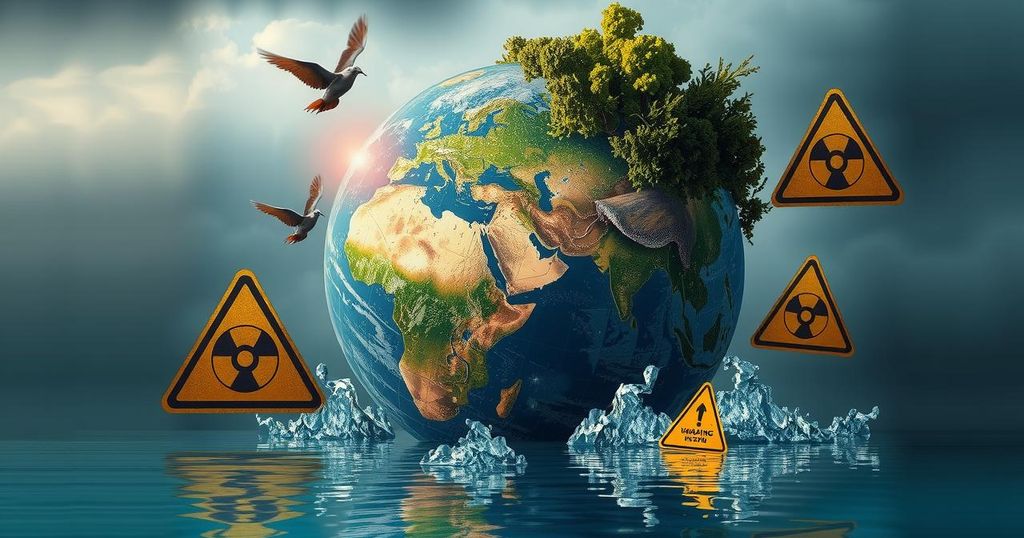Climate Risk Index 2025: Addressing Climate Vulnerability in Pakistan
The Climate Risk Index 2025 by Germanwatch reveals the intensified impacts of climate change, particularly in vulnerable countries like Pakistan, China, and India. The 2022 floods in Pakistan illustrate severe economic losses and human tolls due to extreme weather events. The report underscores the urgent need for global resilience measures, highlighting that effective climate adaptation and targeted financial support for developing nations are essential in mitigating these risks.
The Climate Risk Index (CRI) 2025, published by Germanwatch in February 2025, underscores the growing impacts of climate change and the pressing necessity for improved resilience strategies. The report examines data from 1993 to 2022, contributing to one of the longest-standing indices related to climate impacts. It categorizes countries based on their vulnerability to extreme weather events, with notable mentions of Pakistan, China, India, and the Philippines, which face ongoing climate-related challenges.
The report indicates that inaction on climate issues has led to significant human and economic consequences, with over 765,000 lives lost globally and economic losses close to $4.2 trillion due to more than 9,400 extreme weather occurrences. Dominica, China, and Honduras are identified as the most impacted countries overall; however, Pakistan has been highlighted for particularly severe relative economic losses.
During the 2022 monsoon season, Pakistan was ravaged by floods, landslides, and storms, adversely affecting more than 33 million citizens, resulting in over 1,700 deaths, and incurring nearly $15 billion in damages—these figures do not account for the estimated $16 billion required for reconstruction and climate adaptation. “The 2022 floods have shown Pakistan’s high vulnerability to climate change despite contributing less than one percent of global greenhouse gas emissions.”
The World Bank’s projections from October 2022 revealed the disaster’s extensive nature, with costs escalating. Climate change has aggravated monsoon rains by around 50 percent and worsened socio-economic inequalities. Women’s livelihoods, especially in agriculture and livestock, have been severely impacted, heightening their exposure to gender-based violence during displacement.
In its assessment, the CRI report references the Intergovernmental Panel on Climate Change’s Sixth Assessment Report to substantiate its findings, urging a re-evaluation of international resilience strategies. The implementation of the Sustainable Development Goals, particularly SDG 13, has encountered significant hurdles due to stagnating progress affected by frequent extreme weather events.
The report delineates a clear connection between climate change and security, posing significant threats to individual welfare and national harmony. It suggests that climate-related challenges can exacerbate existing social tensions, particularly in marginalized communities, which are especially susceptible to conflict following extreme weather incidents, thus necessitating effective governance and risk management frameworks.
The report emphasizes the importance of implementing the Sendai Framework for Disaster Risk Reduction and acknowledges the essential role of National Adaptation Plans and Multi-Hazard Early Warning Systems in enhancing global resilience. However, it also raises concerns about the dire need for increased financial support for vulnerable nations and criticizes the COP29’s decision regarding climate finance as lacking rigor.
In conclusion, the Climate Risk Index 2025 report not only highlights the urgent need for effective resilience strategies but also underlines the critical intersections between climate change, socio-economic disparities, and security. It calls for immediate action to mobilize resources and enhance infrastructure to safeguard communities, particularly in vulnerable regions such as Pakistan, which have suffered disproportionately from climate-related adversities. Comprehensive strategies and international cooperation are imperative to address the growing climate crisis effectively.
Original Source: www.thenews.com.pk




Post Comment